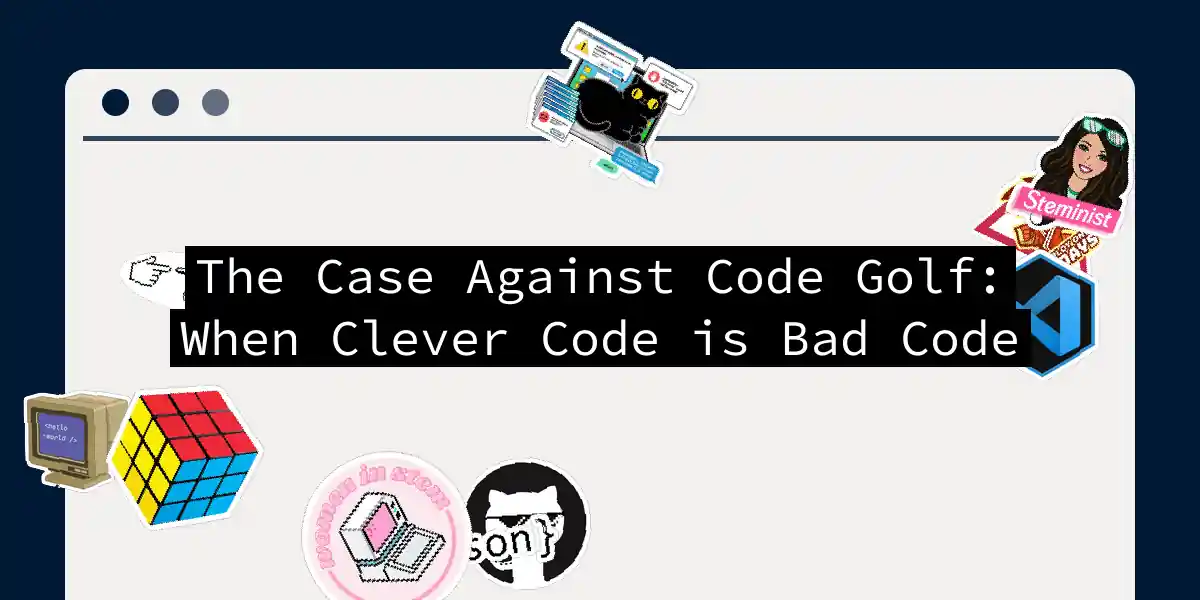Picture this: you’ve just inherited a codebase where every function looks like a cat walked across a keyboard. Variables named x1, a_, and p0lyg0n stare back at you like cryptic runes. As your eyes glaze over, you realize - someone thought they were playing Code Golf: The Developer Edition. Let’s talk about why we need to take away their clubs.
What Even Is Code Golf?
Code golf is the art of solving problems using the fewest possible characters - like writing Shakespeare with emojis. A simple factorial calculator might transform from:
def factorial(n):
if n == 0:
return 1
else:
return n * factorial(n-1)
Into this eldritch horror:
f=lambda n:n<1or n*f(n-1)
While this might win you internet points on coding challenge sites, it’s about as production-ready as a chocolate teapot. I once spent three hours debugging code where someone used _ as a variable name… in 14 different scopes. True story.
Why Smart People Write Dumb Code
We’ve all been seduced by the siren song of cleverness. There’s a perverse pride in writing code that looks like:
cons=a=>b=>f=>f(a,b)
car=c=>c(x=>y=>x)
cdr=c=>c(x=>y=>y)
This elegant lambda calculus implementation is beautiful… if you’re a 1930s mathematician. For the rest of us? It’s like trying to parse IKEA instructions written in ancient Sumerian. The cognitive costs add up:
- The 3AM Debugging Tax: That code you wrote after three Red Bulls? Even you won’t understand it tomorrow
- The Bus Factor: If your code only makes sense during a full moon while standing on one leg, what happens when you win the lottery?
- The Abstraction Trap: Nested ternary operators might feel clever until you need to add a fourth condition
From Golf to Grief: A Refactoring Journey
Let’s take a real-world example from the archives of Bad Ideas™. Consider this prime number checker:
p=lambda n:all(n%i for i in range(2,n))if n>1 else 0
Now let’s transform this into something humans can read: Step 1: Add Actual Names
def is_prime(number):
if number <= 1:
return False
for divisor in range(2, number):
if number % divisor == 0:
return False
return True
Step 2: Add Guard Clauses
def is_prime(number):
if number <= 1:
return False
if number == 2:
return True
if number % 2 == 0:
return False
Step 3: Optimize Readably
def is_prime(number):
if number <= 1:
return False
if number in (2, 3):
return True
if number % 2 == 0:
return False
for divisor in range(3, int(number**0.5) + 1, 2):
if number % divisor == 0:
return False
return True
Now we have code that passes the “3AM jetlagged developer” test. The original? It fails the “author remembers it next Tuesday” test.
When Clever Code Attacks: A Survival Guide
- The Rubber Duck Rule: If you can’t explain it to a bath toy, it’s too complex
- The 24hr Test: Write clever code today? Revisit it tomorrow before committing
- The Team Threshold: Code should be understandable by your junior dev, not just your ego
The Paradox of Clean Code
Here’s the dirty secret: Writing simple code is harder than writing clever code. It’s easier to create a Rube Goldberg machine than a seamless elevator. True mastery lies in making complex things appear simple, not the other way around. As the great Brian Kernighan said:
“Debugging is twice as hard as writing the code in the first place. Therefore, if you write the code as cleverly as possible, you are, by definition, not smart enough to debug it.” So next time you’re tempted to write that 100-character lambda, ask yourself: “Is this code, or an entry for the Obfuscated C Contest?” Your future self - and your colleagues - will thank you. Now if you’ll excuse me, I need to go rewrite some code from 2018 where I thought
a = (b ? c : d)was readable… Wish me luck.
